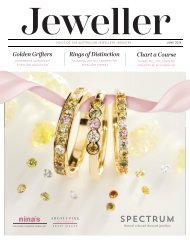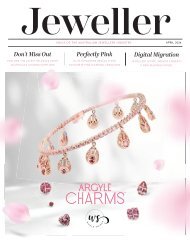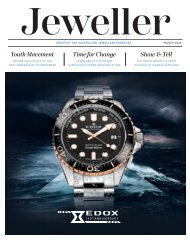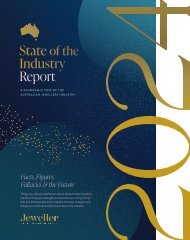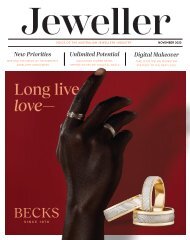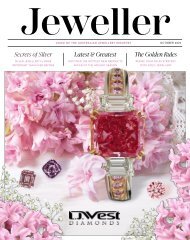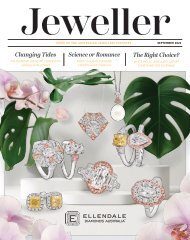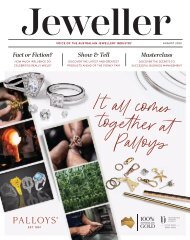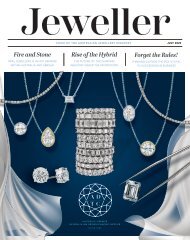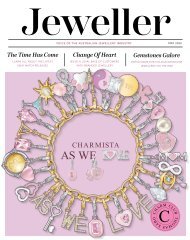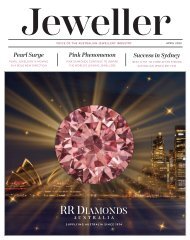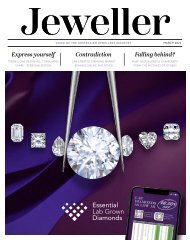Jeweller: The Great Diamond Debate - Round II
Facts Vs Marketing: In 2019, both natural and man-made diamonds battled for the hearts and minds of consumers – and the gloves came off. While the dust is far from settled, the question remains: can consumers really make an informed choice in the midst of a marketing barrage and an increasingly confused industry?
Facts Vs Marketing: In 2019, both natural and man-made diamonds battled for the hearts and minds of consumers – and the gloves came off. While the dust is far from settled, the question remains: can consumers really make an informed choice in the midst of a marketing barrage and an increasingly confused industry?
Create successful ePaper yourself
Turn your PDF publications into a flip-book with our unique Google optimized e-Paper software.
MEDIA<br />
Both sides of the diamond debate<br />
should verify their claims<br />
DANIELLE MAX’S KEY POINTS:<br />
Increasingly, consumers of diamonds are basing their purchasing decision on social and environmental considerations<br />
Consumers do not trust companies to honestly communicate their positive attributes – they require third-party verification<br />
<strong>The</strong>se findings present a promising marketing opportunity for both natural and lab-grown diamond companies, and retailers<br />
A major consumer research study has been<br />
released investigating the need for third-party<br />
verification of both mined and lab-grown<br />
diamond manufacturers’ claims of positive<br />
social and environmental impact.<br />
While that doesn’t trip off the tongue, the report<br />
contains some important observations.<br />
<strong>The</strong> major point is this: about 40 per cent of<br />
consumer-purchasing decisions are driven<br />
by knowledge of social and environmental<br />
responsibility, as well as country of origin claims.<br />
In addition, consumers stated that they would pay<br />
a premium to have detailed knowledge about the<br />
diamonds they purchase, and would value knowing<br />
the country of origin at a jewellery store’s counter.<br />
Since consumers value independent verification<br />
of claims about social and environmental<br />
responsibility, as well as provenance, this is<br />
something retailers and brands should take<br />
into consideration.<br />
Further analysis of the report – published by MVI<br />
Marketing, a luxury brand research firm – shows<br />
that one of the most important considerations<br />
for retailers (after the 4Cs, grading and brand/<br />
company reputation) is that a natural diamond has<br />
been produced using socially and environmentally<br />
responsible methods. <strong>The</strong> same applies for labgrown<br />
stones.<br />
However, the report found that consumers are not<br />
prepared to automatically accept the word of a<br />
brand or company concerning its ‘green’ or ethical<br />
credentials – and nor should they.<br />
A majority of consumers want to know that there<br />
are hard facts and data to support a company’s<br />
claims and assertions.<br />
That’s where the third-party verification comes in;<br />
48 per cent of respondents to the study said<br />
third-party verification of a diamond’s country of<br />
origin and its social and environmental compliance<br />
was ‘very important’, and 41 per cent said it was<br />
‘somewhat important’.<br />
For lab-grown diamonds, those numbers were<br />
44 percent and 42 percent respectively.<br />
<strong>The</strong>se consumers also say they would, ideally,<br />
choose certified responsibly mined or sustainably<br />
manufactured lab-grown diamonds over noncertified<br />
diamonds, to the tune of 86 per cent<br />
(for mined diamonds) and 84 percent (for<br />
lab-grown diamonds).<br />
INFORMING YOUR CUSTOMERS<br />
We already know that today’s consumers are<br />
environmentally and ethically minded, and that<br />
will only increase in the future as Gen Z come of<br />
age and force companies to enact changes in the<br />
way they do business, or risk losing a huge swathe<br />
of influential customers.<br />
Open most diamond mining company’s web<br />
pages and there are sections dedicated to<br />
sustainability, the environment and corporate<br />
social responsibility.<br />
<strong>The</strong> <strong>Diamond</strong> Empowerment Fund – a global<br />
non-profit organisation supported by the<br />
diamond industry – is dedicated to spreading<br />
the message that ‘diamonds do good’.<br />
It does so by supporting initiatives for people<br />
in ‘diamond communities’ – either diamondproducing<br />
countries or regions where natural<br />
diamonds are manufactured.<br />
Its projects include education, women’s<br />
empowerment, and providing care and support for<br />
youth impacted by HIV/AIDS.<br />
Yet, while there’s already so much positive work<br />
currently being undertaken, just saying so isn’t<br />
enough to satisfy savvy and knowledgeable<br />
consumers who spend large amounts of time<br />
researching products before they buy.<br />
When it comes to marketing, there’s also no denying<br />
the power of social proof.<br />
Social proof is an element of behavioural<br />
psychology, in which people trust and emulate<br />
sources of knowledge, including celebrities, experts,<br />
friends, certification and current users of a product.<br />
Think of it as word-of-mouth advertising. Essentially,<br />
doing good is great, but it’s so much more powerful<br />
when someone else says it for you!<br />
Given these factors, it’s critical for both natural<br />
and lab-grown diamond producers to embrace<br />
third-party certification and verification of their<br />
ethical and sustainable claims – and then fully and<br />
clearly communicate them to consumers.<br />
Critically, that certification and authentication<br />
needs to be available to customers at the point<br />
of retail; having this will ultimately build trust and<br />
help secure the sale.<br />
As we know, in the diamond industry, trust is the<br />
key. It’s what consumers demand, and it’s what<br />
they deserve. i<br />
ABOUT THE AUTHOR<br />
Danielle Max is editor in chief IDEX Online, a<br />
leading online diamond-trading platform and<br />
industry publication. IDEX offers buying services,<br />
online transactions, and real time pricing features.<br />
December 2019 <strong>Jeweller</strong> 43




